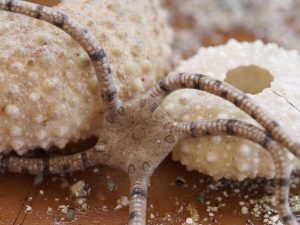I lie on my back on the hammock, swaying gently side-to-side in the breeze. My eyelids float down after a busy morning and afternoon. I witness deep oranges and rusty reds shifting, bursting, and intertwining on the backs of my eyelids, luminescent projections of the intense tropical sunlight. Needless to say, these entrancing visions were enough to lull me to sleep.
This morning I felt quite different – energized and adventurous. Soon after breakfast, my classmates and I measured the sizes of the urchins we caught yesterday at the Marine Protected Area (MPA). We then snorkeled at a non-MPA and carefully collected urchins there. Interestingly, the urchins tended to be larger and more numerous at the MPA. However, the non-MPA was home to the largest urchin we found, a long spine sea urchin (Diadema antillarum) that measured 5.8 cm in diameter.
With its mounds of different corals, the reef visited today was teeming with a plethora of diverse colorful creatures. Some notable sightings included a green sea urchin (Lytechinus variegatus), spiny brittle stars (Ophiocoma paucigranulata), and numerous ctenophores. The green sea urchin was about 4 inches in diameter and found on the seafloor. The spiny brittle stars, found under rubble, had central disks of about an inch in diameter and arms about 3 inches long. The brittle stars would try to move back under the rubble when exposed. None of the echinoderms were visibly interacting with other organisms. Today’s most spectacular sighting was a spotted trunkfish (Lactophyrus bicaudalis); its dynamic black and white speckles contrasted with the mellow blue backdrop of the ocean.
After spending the afternoon discussing my class’ data collected and observations noted, I was exhausted. We had an hour until dinner, so I lied on my back on the hammock.

